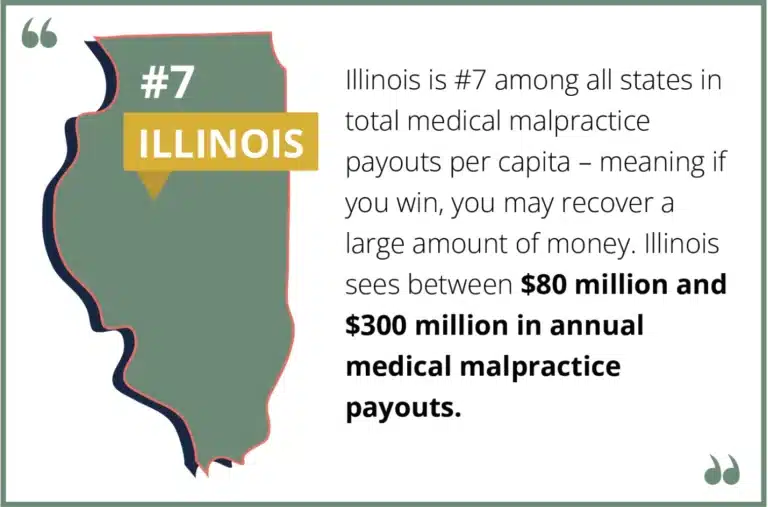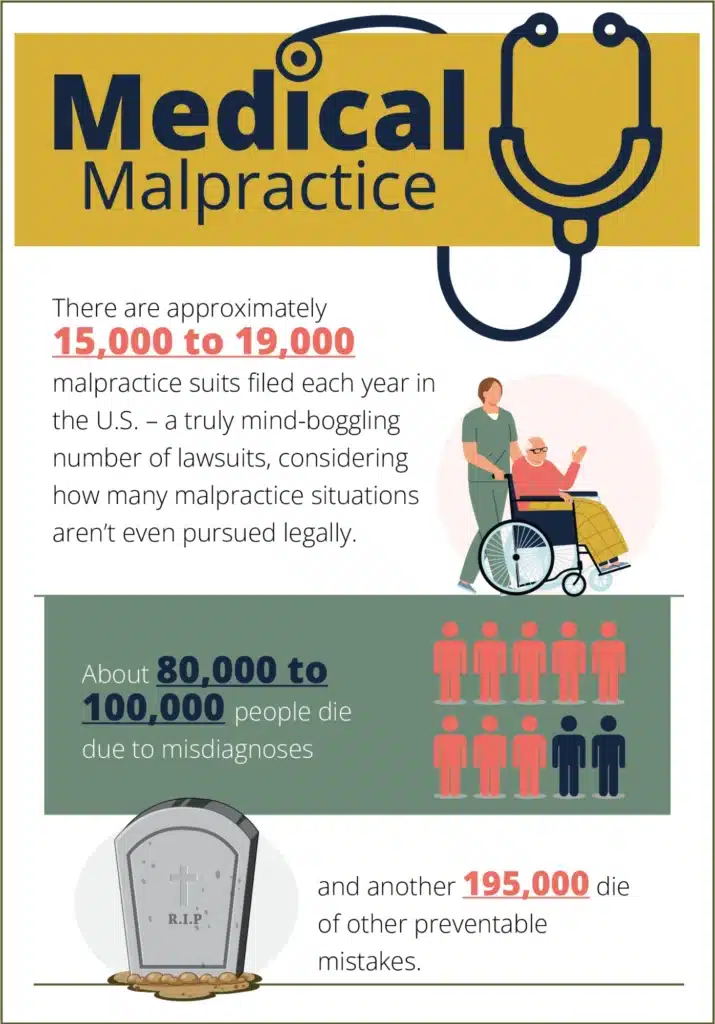Chicago Medical Malpractice Lawyer
At Levin & Perconti, our medical malpractice attorneys have recovered more than $2 billion dollars for our clients. We can conduct a free, no-obligation analysis of your situation, to reveal your potential reimbursement for the harm caused by medical malpractice or negligence.
- Why Choose the Chicago Medical Malpractice Lawyers at Levin & Perconti?
- Frequently Asked Questions About Medical Malpractice
- Example of Medical Malpractice: A Real-Life Case Study
- What Qualifies as Medical Malpractice?
- Proving Medical Negligence in Illinois
- What You Need to Know About Filing a Medical Malpractice Lawsuit
- Is Medical Malpractice Common in Chicago?
- How Can Levin & Perconti Help Victims of Medical Negligence?
- Average Medical Malpractice Settlement Amounts
- Contact a Medical Malpractice Lawyer Today
Negligence in a medical setting is a form of personal injury that is referred to as medical malpractice. Doctors and hospitals that commit medical errors are often unwilling to come forward voluntarily. It takes brave citizens, with the help of experienced medical lawyers, to hold these medical practitioners accountable for malpractice.
We help Illinois residents recover from medical malpractice, birth injury, and nursing home abuse, to receive the reimbursement they need for rehabilitation and life-changing medical circumstances. We’ve seen many people struggle with traumatic medical negligence, and will support you through the entire litigation process.
Why Choose the Chicago Medical Malpractice Lawyers at Levin & Perconti?
Levin & Perconti has helped thousands of injured clients in more than four decades of practice, securing over $2 billion in total compensation for our clients. But don’t let the numbers fool you – we think beyond the payouts, to the human being and their family who has been harmed by medical malpractice. Some of our notable medical malpractice cases include:
- $17.7 Million medical malpractice settlement for a former police officer who suffered a life-altering brain injury due to nursing staff negligence at a Chicago hospital.
- $14 Million record-setting verdict against a doctor and hospital for not following and ignoring abnormal chest X-ray results, which caused a substantial delay in the diagnosis of lung cancer.
- $8.1 Million medical malpractice verdict on behalf of a family whose mother died of lung cancer as a result of a failure to diagnose.
- $5.77 Million for a woman who became paralyzed as a result of a Veterans Administration physician’s failure to recognize worsening neurological symptoms and perform a necessary surgery to relieve spinal cord compression.
- $5 Million medical negligence verdict against a doctor and resident for mishandling a breathing tube, losing our 14-year-old quadriplegic client’s airway, which led to her death.
- $3 Million medical malpractice settlement for an 84-year-old woman who was permanently paralyzed when a Chicago neurosurgeon caused irreparable damage to her spinal cord during a procedure.
Additionally, our Chicago medical malpractice attorneys, like Mike Bonamarte and Margaret Battersby-Black are on the nation’s best personal injury lawyer lists, including the Illinois Top 100, SuperLawyers and Best Lawyers in America. Our team of excellent lawyers continues to lead the industry with their published work, professional presentations and being involved in the community.

Past Client Testimonials
Don’t take our word for it. Hear from some of the medical malpractice victims we’ve helped:
Frequently Asked Questions About Medical Malpractice
display:none;
Accordion Content
What is a Medical Malpractice Lawsuit?
A medical malpractice lawsuit is filed when someone is injured or killed because of the negligence of their medical providers. Unfortunately, every day, medical mistakes are made in Chicago’s hospitals, clinics, dentists’ offices, and other healthcare facilities. When a mistake occurs that causes the patient to suffer a catastrophic personal injury , the law allows victims to take legal action to recover fair compensation for their medical bills, lost wages, pain and suffering, and other losses.
Who Can File a Medical Malpractice Lawsuit?
A lawsuit can be filed by anyone who has been injured because of negligent care by their medical professional—doctors, nurses, nursing assistants, dentists, and others. If the victim was killed because of the error, the surviving family members can file the suit on the victim’s behalf. Children who are injured can file suit, but obviously the parents are the individuals who take the steps on their child’s behalf.
When Can a Medical Malpractice Lawsuit be Filed?
The lawsuit can begin as soon as you learn about an injury that should have been prevented by your medical provider. However, there is a time limit that applies to these cases, known as a Statute of Limitations. That means that it is very important to contact a Chicago personal injury lawyer soon after you learn of the injury. For example, in most cases you must file a claim within two years of the time that you became aware of the injury (735 Ill. Comp. State. Ann. §5/13-212(a)). However the rules are different for child victims and in a few other circumstances. A medical malpractice lawyer will be able to explain what applies in your case.
How Much Does a Medical Malpractice Lawsuit Cost?
You will pay no attorneys’ fees unless or until we recover compensation for you.
We understand that victims of medical malpractice are often placed in difficult financial situations. Hospital bills add up, wages at work are lost, and other expenses mount. It is for those reasons that we work on a contingency fee basis. Our Chicago medical malpractice lawyers have the resources to conduct an investigation and pay the court costs on your behalf. We only receive a payment if your case is successfully resolved. This allows a victim to receive fair compensation even if they do not have the money upfront.
Medical Malpractice: A Challenging Battle

One thing is for sure: You shouldn’t go at it alone when trying to fight medical malpractice.
It can be tough to set aside your emotional struggles and focus on the legal aspects of your situation. You may never receive an apology or acknowledgment of any kind from the medical provider – whether you win a legal battle or not.
However, here’s some good news: Illinois is #7 among all states in total medical malpractice payouts per capita – meaning if you win, you may recover a large amount of money. Illinois sees between $80 million and $300 million in annual medical malpractice payouts.
Example of Medical Malpractice: A Real-Life Case Study
Failure to administer medical tests, making misdiagnoses, and reading test results improperly contribute to the majority of medical malpractice lawsuits. In the following scenario – which is a real case handled by our medical malpractice attorneys at Levin & Perconti – a pregnant mother suffered a devastating medical error.
The mother-to-be visited an Illinois medical provider for ongoing prenatal care. During the course of her care, the provider failed to test her for Group B strep. This is a routine test that should be performed by every prenatal provider, according to decades of recommendations from the World Health Organization, Journal of the American Medical Association, and other medical authorities.
The test that was never taken for Group B strep would have been positive. The mother had the illness, and therefore passed it to her daughter during delivery. As a result, the baby developed meningitis and now suffers permanent brain damage.
A Chicago medical malpractice attorney and their team from Levin & Perconti helped this suffering mother secure a $9 million medical malpractice settlement against the medical provider. Although the settlement can never undo the damage that was done, it helps the mother with ongoing support for her daughter.
What are the Most Common Types of Medical Malpractice Claims we Handle?
Medical negligence can happen in many forms and settings, often leading to serious injury or death for patients who trusted their healthcare providers. At Levin & Perconti, we handle a wide range of medical malpractice cases where healthcare providers fail to meet the expected standard of care, causing harm. We represent clients in various medical malpractice scenarios across Illinois.
Below are some of the most common types of medical malpractice claims we handle:
 Anesthesiologist Error
Anesthesiologist Error
Errors made during the administration of anesthesia can have severe consequences. These mistakes may include miscalculating the dosage of anesthesia, making intubation errors, or improperly monitoring a patient’s vital signs. Such errors can potentially lead to respiratory distress, brain damage, allergic reactions, or even death.
 Misdiagnosis
Misdiagnosis
This occurs when a doctor incorrectly identifies a patient’s medical condition. It can result from inadequate medical histories, ignoring symptoms of serious conditions, or failing to order necessary tests. Misdiagnosis can lead to a lack of treatment, inappropriate or unnecessary treatments, and delayed intervention, potentially causing severe health complications. An estimated 12 million Americans experience a diagnostic error in primary care each year, and clinical misjudgment accounts for a significant percentage of these errors.
 Cancer Misdiagnosis
Cancer Misdiagnosis
Cancer misdiagnosis is a specific and often devastating type of misdiagnosis. It represents a large portion of wrong diagnosis claims. Cases involve failure to properly read tests like Pap smears, leading to missed cervical cancer, or failure to biopsy tumors, delaying diagnosis and treatment.
 Heart Attack Misdiagnosis
Heart Attack Misdiagnosis
Diagnosing heart attacks can be complex due to varied symptoms. Misdiagnosis can happen if symptoms are misinterpreted as less severe conditions like indigestion or anxiety, or if necessary tests like EKGs or blood tests are not conducted or are misread. Overlooking atypical symptoms in certain patient populations or failing to recognize silent heart attacks also contributes to these errors.
 Delayed Diagnosis
Delayed Diagnosis
This involves a medical professional taking too long to identify a patient’s medical condition. The excessive delay in diagnosis can result in postponed treatment, reducing treatment options, and potentially leading to more severe health complications for the patient. Examples include delays in diagnosing conditions like lung cancer or postpartum issues based on ignored symptoms or test results.
 Failure to Diagnose
Failure to Diagnose
A failure to diagnose occurs when a healthcare provider overlooks or misses a medical condition entirely. This lack of diagnosis means the patient does not receive the necessary treatment, which can have severe or fatal consequences. This can be caused by incomplete patient histories, neglecting symptoms, or failing to order appropriate diagnostic tests.
 Lack of Informed Consent
Lack of Informed Consent
Healthcare providers are required to adequately inform patients about the potential benefits, risks, and alternatives of a medical procedure or treatment before proceeding. A lack of informed consent claim arises when a provider fails in this duty, and the patient suffers harm as a result of a procedure they did not fully understand or agree to.
 Birth Injuries
Birth Injuries
These cases involve harm sustained by either the mother or the child during pregnancy, labor, delivery, or shortly after birth due to trauma or medical errors. Birth injuries can result from various mistakes, such as the improper use of birthing tools, failure to detect fetal distress, or delays in performing a necessary C-section. Common outcomes include brain injuries like cerebral palsy or brachial plexus injuries.
 Healthcare Provider Errors
Healthcare Provider Errors
This broad category encompasses mistakes made by any medical professional, including doctors, nurses, technicians, and hospital staff, who fail to meet the standard of care. These errors can manifest in numerous ways, such as misdiagnoses, incorrect medication dosages, surgical mistakes, or failures in communication or charting. Overworked staff, inadequate training, or poor hospital protocols can contribute to these errors.
 Misread X–rays, Slides, and Ultrasounds
Misread X–rays, Slides, and Ultrasounds
Errors in interpreting diagnostic imaging and test results are a significant cause of medical malpractice. A radiologist misreading an X-ray, a pathologist misinterpreting lab slides, or a technician misreading an ultrasound can lead to a missed or incorrect diagnosis of serious conditions like cancer or tumors, delaying critical treatment.
 Medical Device Error
Medical Device Error
These claims involve injuries or death caused by defective medical devices. Defects can stem from the device’s design, manufacturing process, or marketing information. When commonly used devices like pacemakers or hip replacements malfunction, patients can suffer severe complications, leading to product liability claims against manufacturers or hospitals.
 HMO Misconduct
HMO Misconduct
Healthcare Management Organizations (HMOs) or their affiliated doctors can be held liable for misconduct that leads to patient harm. This can include instances where an HMO doctor fails to diagnose a condition or disregards patient complaints, resulting in delayed or improper care and subsequent injury or death.
 Medication & Pharmaceutical Errors
Medication & Pharmaceutical Errors
These preventable errors occur when healthcare professionals fail to follow best practices in prescribing, dispensing, or administering medications. Mistakes can include giving the wrong medication or dosage, administering it incorrectly, or overlooking dangerous drug interactions. Such errors can cause severe harm, including hospitalization, permanent injury, or death.
 Spinal Cord Injuries
Spinal Cord Injuries
Medical negligence can result in severe and permanent spinal cord injuries. Cases may involve surgeons causing damage during procedures, or healthcare providers failing to recognize worsening neurological symptoms and delaying necessary intervention to relieve spinal cord compression. These injuries often lead to permanent disability or paralysis.
 Nursing Home Abuse & Neglect
Nursing Home Abuse & Neglect
Residents in nursing homes can suffer harm due to the negligence or intentional acts of staff. This can include medication mismanagement, falls, neglect leading to infections like MRSA, or other failures to provide appropriate care based on the standard of care for vulnerable residents.
 Surgical Errors
Surgical Errors
Mistakes made during surgery are preventable errors that can cause significant patient injury or death. These errors range from operating on the wrong site or patient to damaging nerves or organs, performing the incorrect procedure, or leaving foreign objects inside the body cavity.
 Staph Infection
Staph Infection
Patients can acquire serious infections, such as Staph infections (like MRSA), while in a hospital or healthcare facility. If these infections are contracted or worsen due to negligent care, such as poor sanitation or failure to properly treat an existing infection, the hospital or staff may be liable for the resulting complications and harm.
 OB-GYN Error
OB-GYN Error
Obstetrics and Gynecology (OB-GYN) malpractice involves negligence in care related to women’s health, including pregnancy, labor, delivery, and gynecological procedures. Errors can range from mismanaging labor and delivery, leading to birth injuries, to failing to diagnose critical conditions during pregnancy or performing unnecessary surgical procedures.
Proving Medical Negligence in Illinois
In general, a plaintiff in a medical malpractice lawsuit must prove 5 things in order to prevent having a lawsuit dismissed by the court:
- There was a doctor-patient relationship
- There was a duty of care that the doctor should have provided
- The doctor breached the duty of care
- The breach of care caused the patient’s injuries
- The patient suffered damages as a result: physical, emotional, financial
To hold a negligent doctor liable for your injury, you and your medical malpractice attorney will need to show that they deviated from acceptable medical practices and standards. In fact, you’ll need to prove that another, more competent, doctor would have acted differently to prevent harm.
Video: Margaret Battersby-Black answers the question “How to find out if my Illinois doctor has been sued?”.
What You Need to Know About Filing a Medical Malpractice Lawsuit
- It can happen at any stage in the medical service process – during diagnosis, treatment, recovery, or advice following treatment.
- It can also happen at any kind of medical facility, from a walk-in clinic to an emergency room to a specialized surgical center.
- To prove malpractice, you will need a medical report from a consulting physician, under Illinois law. This physician will provide an explanation of medical standards and how your treatment would normally be handled.
- You may also need additional testimony from incident witnesses or expert witnesses. Rely on your malpractice attorney’s advice about witness testimony.
- There is a statute of limitations that is generally within 2 years of the incident or discovery date, and not more than 4 years from the incident. Lawsuits involving minors must be brought before they turn 22 years old and within 8 years of the alleged incident.
- The severity of your injury may contribute to a decision about pursuing your case. In terms of litigation and economic value, only in the most severe cases do the benefits outweigh the costs. We’ll help you do a calculation that makes this clearer for your individual case.
- Prepare yourself: Medical malpractice lawsuits are some of the longest-term legal cases out there. It may take months or years to prepare your case and bring it to court. In addition, your case might be tried by either a judge or jury – which varies the timing – and it might be delayed or appealed as a part of the legal process.
Is Medical Malpractice Common in Chicago?
There are approximately 15,000 to 19,000 malpractice suits filed each year in the U.S. – a truly mind-boggling number of lawsuits, considering how many malpractice situations aren’t even pursued legally. About 80,000 to 100,00 people die due to misdiagnoses, and another 195,000 die of other preventable mistakes.
Health care is complex and, unfortunately, leaves a lot of room for error. However, some acts of medical malpractice are purely caused by the carelessness and intentional acts of medical staff. They might be busy, sleep-deprived, or stressed out, but there is no excuse for medical malpractice.
Here’s something startling about the prevalence of medical malpractice: 1 in 3 people experience errors during a medical visit, but the majority don’t even realize it. Constant errors, which become almost routine in poorly-managed medical operations, can become invisible in the day-in, day-out of health care.
Our attorneys represent clients who have been injured or killed by careless health care providers – hospitals, doctors, nurses, psychiatrists, dentists, chiropractors, podiatrists, and more. Sometimes a negligent act by a medical professional doesn’t rise to the level of a crime but absolutely DOES provide the basis for a medical malpractice lawsuit.
Medical malpractice is often the result of things like:
- Reduced staffing or hours of monitoring at medical facilities
- Failure to hire and train skilled medical workers
- Not following medical guidelines or Illinois laws
- Unethical and neglectful procedures
- Doctors who practice non-standard methods
Although hospitals and doctors may not be motivated to discuss medical errors, Levin & Perconti works to uncover the truth. Our medical negligence lawyers hold them accountable for medical malpractice.

How Can Levin & Perconti Help Victims of Medical Negligence?
It can be difficult and traumatic to cope with incidents of medical malpractice. Our #1 priority is guiding you through this challenging time, to protect and reimburse you for the suffering you and your loved ones have experienced.
Our nationally recognized medical malpractice lawyers in Chicago will:
- Review your case to ensure it meets legal standards for malpractice
- Research reports from state and federal regulators
- Request medical records from health care providers
- Investigate bills, billing procedures and Medicare payments
- Ensure access to charts and files from medical providers
- Facilitate photographs when necessary
- Connect with witnesses and expert witnesses
- Take depositions, which will be used in court
- Help you understand standards of care that medical providers must meet
- File lawsuits and negotiate settlements, depending on our situation and preferences
- Take you seriously and support you during the entire process

Average Medical Malpractice Settlement Amounts
At Levin & Perconti, our clients often ask what kind of payout they might expect in a malpractice lawsuit. Of course, this is a hard question to answer because there are a lot of variations depending on your situation.
An estimate is never a guarantee, but it’s helpful to have some idea of what you can anticipate in a medical malpractice suit. Let’s look at some nationwide statistics.
U.S. average payouts by severity of outcome:
These are averages. Your payout may be much more or less.
- Brain damage, quadriplegic, or lifelong care: $1.13 million
- Major permanent injury: $622,168
- Significant permanent injury: $450,251
- Death: $385,648
- Major temporary injury: $215,247
- Minor permanent injury: $205,316
- Minor temporary injury: $75,502
- Emotional injury: $75,392
Contact a Medical Malpractice Lawyer Today
If you have experienced medical malpractice in Chicago or throughout Illinois, take action and immediately contact Levin & Perconti online or call us at 877-374-1417 or 312-332-2872 to set up a free consultation with an experienced Chicago medical malpractice lawyer.
Our consultations are free, confidential, convenient, and respectful of your difficult experience. No other legal team in Illinois has a track record like ours. We’re ready to help you recover from medical malpractice and get the reimbursement you deserve.
Legally Reviewed by

Michael F. Bonamarte, IV
Contact Us
- Free Consultation
- (312) 332-2872
"*" indicates required fields
Related Pages
- Anesthesiologist Error
- Birth Injury
- Chiropractor Malpractice
- Defective Medical Device Lawyer
- Emergency Room Negligence
- HMO Misconduct
- Hospital Staph Infection Lawsuit
- Lack of Informed Consent
- Medication & Pharmaceutical Error
- Misdiagnosis or Failure to Diagnosis
- Nursing Home Abuse
- Nursing Malpractice
- OG/GYN Negligence
- Radiological Error
- Surgical Error
Notable Results
SETTLEMENT
child who suffered a catastrophic hypoxic-ischemic brain injury as a result of a negligent neonatal resuscitation and intubation
SETTLEMENT
for a former police officer who suffered a life-altering brain injury due to nursing staff negligence at a Chicago hospital
VERDICT
on behalf of a family whose mother died of lung cancer in 2015 as a result of a failure to diagnose
FAQs
- How Long Does a Medical Malpractice Lawsuit Take?
- How Do I Contact a Medical Malpractice Lawyer?
- How Do I Choose the Best Medical Malpractice Lawyer?
- How Do I Know If I Have a Medical Malpractice Case?
- How Much Does a Medical Malpractice Lawyer Cost?
- Can You Sue a Doctor for Negligence?
- Can You Sue a Hospital for Emotional Distress?
Our Office
325 N LaSalle Dr Suite 300
Chicago, IL 60654
312-332-2872